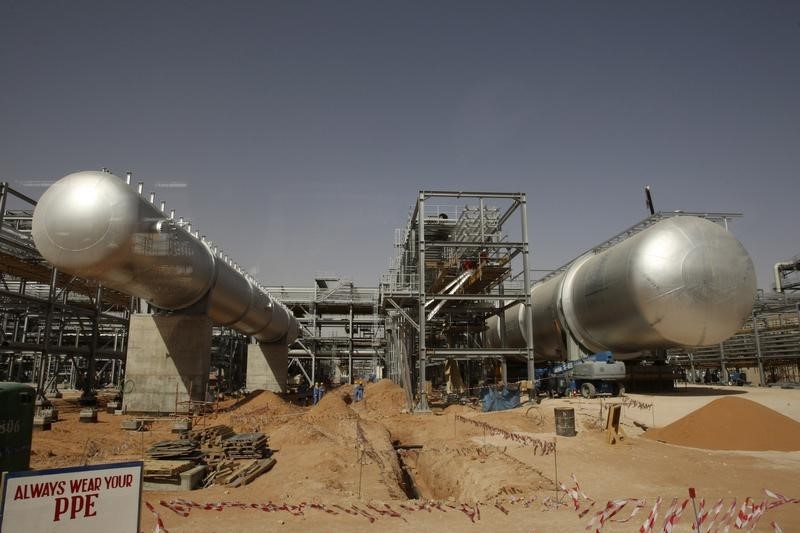Is this U.S.-China selloff a buy? A top Wall Street voice weighs in
(Clarifies sourcing in 4th and 7th paragraphs)
* Saudi, Russia have reserves of $500 bln each
* Russia says can withstand low oil for 6-10 years
* Saudi says to pump more oil, cuts oil prices
* Russia c.bank suspends forex purchases
* GRAPHIC-OPEC losses: https://tmsnrt.rs/2TOo7nb
By Davide Barbuscia and Darya Korsunskaya
DUBAI/MOSCOW, March 9 (Reuters) - Oil titans Russia and
Saudi Arabia have accumulated vast financial cushions that will
help them weather a lengthy price war. It's a battle of nerves -
so who will blink first?
Global oil prices crashed by a third after Riyadh discounted
its crude and signalled it would raise output. Shares in
national oil champions Saudi Aramco (SE:2222) and Rosneft tanked.
nL8N2AZ21V]
The world's top two oil exporters each have war chests of
around $500 billion to weather economic shocks and are making
bullish noises about their stamina as they square up.
Moscow said on Monday it could withstand oil prices of
$25-$30 per barrel for 6-10 years. Riyadh, meanwhile, can afford
oil at $30 a barrel, but would have to sell more crude to soften
the hit to its revenue, according to sources familiar with the
matter. A war of attrition would nonetheless be damaging and force
both countries to make difficult adjustments to their economies
the longer it dragged on.
"As with any war this comes down to how much pain can be
absorbed by each side," said Hasnain Malik, head of equity
strategy at Tellimer.
MbS OPENS THE TAPS
In Saudi Arabia, Crown Prince Mohammed bin Salman gave the
green light for the kingdom, the world's top oil exporter, to
pump at will after Russia rejected an OPEC proposal for deeper
cuts to cope with the coronavirus outbreak, two sources familiar
with the matter said.
The Saudi fiscal breakeven - the oil price at which it would
balance its budget - is at around $80 a barrel, double that of
Russia, said Malik at Tellimer.
Saudi Arabia enjoys foreign reserves of $500 billion and a
low debt-to-GDP ratio of 25% that gives it ample room to borrow.
Saudi Arabia has raised over $100 billion in hard-currency
debt since 2016 to offset the impact of lower oil prices.
International bonds issued by the government and its oil
giant Aramco plunged in early trade on Monday, and the Saudi
riyal fell sharply against the U.S. dollar in the forwards
market. Still, low global interest rates and a recent further cut by
the U.S. Federal Reserve mean that despite market volatility
borrowers could tap debt investors relatively cheaply.
The problem for Riyadh is that sustained low oil prices
could likely constrain government spending on projects that are
part of the crown prince's drive to diversify the economy.
Monica Malik, chief economist at Abu Dhabi Commercial Bank,
said that with oil prices in the low $30s, Saudi Arabia would
post a double-digit deficit as percentage of GDP this year - up
from Riyadh's own 6.4% budget deficit projection.
'TREASURE CHEST'
Under President Vladimir Putin, Russia has amassed reserves
of $570 billion and the rouble has become free-floating,
allowing it to swiftly adjust to market conditions and devalue.
Russia, say analysts, is much better placed to withstand an
economic shock than it was in 2014 when the West imposed
sanctions over its annexation of Ukraine's Crimea, or than in
2008 when it was buffeted by the global financial crisis.
"Many people criticised us, they said this is a kind of
treasure chest, that the finance ministry is sitting on gold,"
Finance Minister Anton Siluanov said last week about the
reserves.
"But now the situation could change and we will finance all
the expenses we have undertaken and are obliged to make with
this treasure chest."
The $570 billion reserves includes the country's National
Wealth Fund, which stands at $150.1 billion or 9.2% of Russia's
GDP. The finance ministry said on Monday the fund could be used
to offset lower oil revenues if necessary.
The central bank meanwhile said it was suspending foreign
currency purchases for 30 days in an attempt to ease downside
pressure on the rouble and would take market conditions into
account when deciding whether to go ahead with future Russian
rouble OFZ government bond auctions.
Still, the rouble crashed to its weakest level since early
2016 on the interbank market and shares in Russian companies
fell sharply in London with oil giants Rosneft and Lukoil down
20.4% and 18.5 percent respectively ROSNq.L LKOHyq.L .
Oleg Vyugin, head of Moscow Exchange's Supervisory Board,
said Russia would face higher inflation and interest rates as a
result of the price war.
Chris Weafer, director at Macro-Advisory consultancy, said
it was still possible Moscow could decide to return to
cooperating with OPEC by autumn if prices remained very low.
"Putin will be reluctant to run down financial reserves too
far to fund an expanding deficit," he added.
<^^^^^^^^^^^^^^^^^^^^^^^^^^^^^^^^^^^^^^^^^^^^^^^^^^^^^^^^^^^
GRAPHIC-OPEC losses https://tmsnrt.rs/2TOo7nb
^^^^^^^^^^^^^^^^^^^^^^^^^^^^^^^^^^^^^^^^^^^^^^^^^^^^^^^^^^^>
